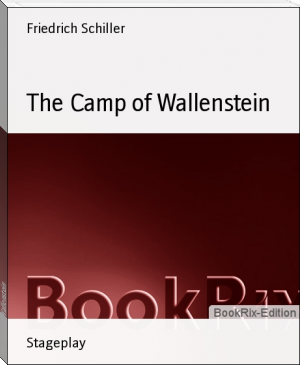The Camp of Wallenstein by Friedrich Schiller (howl and other poems .txt) 📖

- Author: Friedrich Schiller
Book online «The Camp of Wallenstein by Friedrich Schiller (howl and other poems .txt) 📖». Author Friedrich Schiller
DRAGOON. From distant Erin came I here.
SERGEANT (to the two Cuirassiers). You're a Walloon, my friend, that's clear, And you, an Italian, as all may hear.
FIRST CUIRASSIER. Who I may be, faith! I never could say; In my infant years they stole me away.
SERGEANT. And you, from what far land may you be?
FIRST ARQUEBUSIER. I come from Buchau - on the Feder Sea.
SERGEANT. Neighbor, and you?
SECOND ARQUEBUSIER.
I am a Swiss.
SERGEANT (to the second Yager). And Yager, let's hear where your country is?
SECOND YAGER. Up above Wismar my fathers dwell.
SERGEANT (pointing to the Trumpeter). And he's from Eger - and I as well: And now, my comrades, I ask you whether, Would any one think, when looking at us, That we, from the North and South, had thus Been hitherward drifted and blown together? Do we not seem as hewn from one mass? Stand we not close against the foe As though we were glued or moulded so? Like mill-work don't we move, d'ye think! 'Mong ourselves in the nick, at a word or wink. Who has thus cast us here all as one, Now to be severed again by none? Who? why, no other than Wallenstein!
FIRST YAGER. In my life it ne'er was a thought of mine Whether we suited each other or not, I let myself go with the rest of the lot.
FIRST CUIRASSIER. I quite agree in the sergeant's opinion - They'd fain have an end of our camp dominion, And trample the soldier down, that they May govern alone in their own good way. 'Tis a conspiration - a plot, I say!
SUTLER-WOMAN. A conspiration - God help the day! Then my customers won't have cash to pay.
SERGEANT. Why, faith, we shall all be bankrupts made; The captains and generals, most of them, paid The costs of the regiments with private cash, And, wishing, 'bove all, to cut a dash, Went a little beyond their means - but thought, No doubt, that they thus had a bargain bought. Now they'll be cheated, sirs, one and all, Should our chief, our head, the general fall.
SUTLER-WOMAN. Oh, Heaven! this curse I never can brook Why, half of the army stand in my book. Two hundred dollars I've trusted madly That Count Isolani who pays so badly.
FIRST CUIRASSIER. Well, comrades, let's fix on what's to be done - Of the ways to save us, I see but one; If we hold together we need not fear; So let us stand out as one man here; And then they may order and send as they will, Fast planted we'll stick in Bohemia still. We'll never give in - no, nor march an inch, We stand on our honor, and must not flinch.
SECOND YAGER. We're not to be driven the country about, Let 'em come here, and they'll find it out.
FIRST ARQUEBUSIER. Good sirs, 'twere well to bethink ye still, That such is the emperor's sovereign will.
TRUMPETER. Oh, as to the emperor, we needn't be nice.
FIRST ARQUEBUSIER. Let me not hear you say so twice.
TRUMPETER. Why, 'tis even so - as I just have said.
FIRST YAGER. True, man - I've always heard 'em say, 'Tis Friedland, alone, you've here to obey.
SERGEANT. By our bargain with him it should be so, Absolute power is his, you must know, We've war, or peace, but as he may please, Or gold or goods he has power to seize, And hanging or pardon his will decrees. Captains and colonels he makes - and he, In short, by the imperial seal is free, To hold all the marks of sovereignty.
FIRST ARQUEBUSIER. The duke is high and of mighty will, But yet must remain, for good or for ill, Like us all, but the emperor's servant still.
SERGEANT. Not like us all - I there disagree - Friedland is quite independent and free, The Bavarian is no more a prince than he For, was I not by myself to see, When on duty at Brandeis, how the emperor said, He wished him to cover his princely head.
FIRST ARQUEBUSIER. That was because of the Mecklenburgh land, Which he held in pawn from the emperor's hand.
FIRST YAGER (to the Sergeant). In the emperor's presence, man! say you so? That, beyond doubt, was a wonderful go!
SERGEANT (feels in his pocket). If you question my word in what I have told, I can give you something to grasp and hold.
[Showing a coin. Whose image and stamp d'ye here behold?
SUTLER-WOMAN. Oh! that is a Wallenstein's, sure!
SERGEANT-MAJOR. Well, there, you have it - what doubt can rest Is he not prince, just as good as the best? Coins he not money like Ferdinand? Hath he not his own subjects and land? Is he not called your highness, I pray? And why should he not have his soldiers in?
FIRST ARQUEBUSIER. That no one has ever meant to gainsay; But we're still at the emperor's beck and call, For his majesty 'tis who pays us all.
TRUMPETER. In your teeth I deny it - and will again - His majesty 'tis who pays us not, For this forty weeks, say, what have we got But a promise to pay, believed in vain?
FIRST ARQUEBUSIER. What then! 'tis kept in safe hands, I suppose.
FIRST CUIRASSIER. Peace, good sirs, will you come to blows? Have you a quarrel and squabble to know If the emperor be our master or no? 'Tis because of our rank, as his soldiers brave, That we scorn the lot of the herded slave; And will not be driven from place to place, As priest or puppies our path may trace. And, tell me, is't not the sovereign's gain, If the soldiers their dignity will maintain? Who but his soldiers give him the state Of a mighty, wide-ruling potentate? Make and preserve for him, far and near, The voice which Christendom quakes to hear? Well enough they may his yoke-chain bear, Who feast on his favors, and daily share, In golden chambers, his sumptuous fare. We - we of his splendors have no part, Naught but hard wearying toil and care, And the pride that lives in a soldier's heart.
SECOND YAGER. All great tyrants and kings have shown Their wit, as I take it, in what they've done; They've trampled all others with stern command, But the soldier they've led with a gentle hand.
FIRST CUIRASSIER. The soldier his worth must understand; Whoe'er doesn't nobly drive the trade, 'Twere best from the business far he'd stayed. If I cheerily set my life on a throw, Something still better than life I'll know; Or I'll stand to be slain for the paltry pelf, As the Croat still does - and scorn myself.
BOTH PAGERS. Yes - honor is dearer than life itself.
FIRST CUIRASSIER. The sword is no plough, nor delving tool, He, who would till with it, is but a fool. For us, neither grass nor grain doth grow, Houseless the soldier is doomed to go, A changeful wanderer over the earth, Ne'er knowing the warmth of a home-lit hearth. The city glances - he halts - not there - Nor in village meadows, so green and fair; The vintage and harvest wreath are twined He sees, but must leave them far behind. Then, tell me, what hath the soldier left, If he's once of his self-esteem bereft? Something he must have his own to call, Or on slaughter and burnings at once he'll fall.
FIRST ARQUEBUSIER. God knows, 'tis a wretched life to live!
FIRST CUIRASSIER. Yet one, which I, for no other would give, Look ye - far round in the world I've been, And all of its different service seen. The Venetian Republic - the Kings of Spain And Naples I've served, and served in vain. Fortune still frowned - and merchant and knight, Craftsmen and Jesuit, have met my sight; Yet, of all their jackets, not one have I known To please me like this steel coat of my own.
FIRST ARQUEBUSIER. Well - that now is what I can scarcely say.
FIRST CUIRASSIER. In the world, a man who would make his way, Must plague and bestir himself night and day. To honor and place if he choose the road, He must bend his back to the golden load. And if home-delights should his fancy please, With children and grandchildren round his knees, Let him follow an honest trade in peace. I've no taste for this kind of life - not I! Free will I live, and as freely die. No man's spoiler nor heir will I be - But, throned on my nag, I will smile to see The coil of the crowd that is under me.
FIRST YAGER. Bravo! - that's as I've always done.
FIRST ARQUEBUSIER. In truth, sirs, it may be far better fun To trample thus over your neighbor's crown.
FIRST CUIRASSIER. Comrade, the times are bad of late - The sword and the scales live separate. But do not then blame that I've preferred, Of the two, to lean, as I have, to the sword. For mercy in war I will yield to none, Though I never will stoop to be drummed upon.
FIRST ARQUEBUSIER. Who but the soldier the blame should bear That the laboring poor so hardly fare? The war with its plagues, which all have blasted Now sixteen years in the land hath lasted.
FIRST CUIRASSIER. Why, brother, the blessed God above Can't have from us all an equal love. One prays for the sun, at which t'other will fret One is for dry weather-t'other for wet. What you, now, regard as with misery rife, Is to me the unclouded sun of life. If 'tis at the cost of the burgher and boor, I really am sorry that they must endure; But how can I help it? Here, you must know, 'Tis just like a cavalry charge 'gainst the foe: The steeds loud snorting, and on they go! Whoever may lie in the mid-career - Be it my brother or son so dear, Should his dying groan my heart divide, Yet over his body I needs must ride, Nor pitying stop to drag him aside.
FIRST YAGER. True - who ever asks how another may bide?
FIRST CUIRASSIER. Thus, my lads, 'tis my counsel, while On the soldier Dame Fortune deigns to smile, That we with both hands her bounty clasp, For it may not be much longer left to our grasp. Peace will be coming some over-night, And then there's an end of our martial might. The soldier unhorsed, and fresh mounted to boor, Ere you can think it 'twill be as before. As yet we're together firm bound in the land, The hilt is yet fast in the soldier's hand. But let 'em divide us, and
 In literature a drama genre deserves your attention. Dramas are usually called plays. Every person is made up of two parts: good and evil. Due to life circumstances, the human reveals one or another side of his nature. In drama we can see the full range of emotions : it can be love, jealousy, hatred, fear, etc. The best drama books are full of dialogue. This type of drama is one of the oldest forms of storytelling and has existed almost since the beginning of humanity. Drama genre - these are events that involve a lot of people. People most often suffer in this genre, because they are selfish. People always think to themselves first, they want have a benefit.
In literature a drama genre deserves your attention. Dramas are usually called plays. Every person is made up of two parts: good and evil. Due to life circumstances, the human reveals one or another side of his nature. In drama we can see the full range of emotions : it can be love, jealousy, hatred, fear, etc. The best drama books are full of dialogue. This type of drama is one of the oldest forms of storytelling and has existed almost since the beginning of humanity. Drama genre - these are events that involve a lot of people. People most often suffer in this genre, because they are selfish. People always think to themselves first, they want have a benefit.




Comments (0)